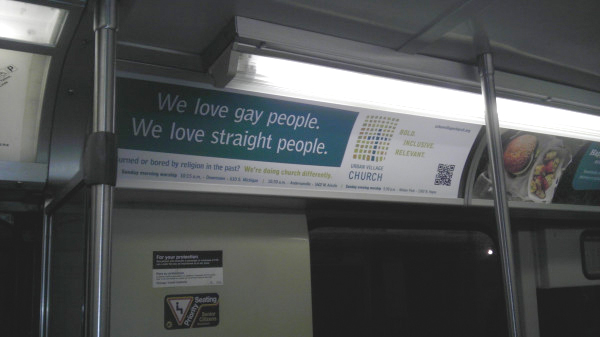Today I saw a couple of tweets from Todd Rhoades (no relation to me) that spoke of church growth & membership. In one, he linked to a blog post titled “Mainline Desperation” and quoted J. Barrett Owen, beginning:
We look at the work it’s going to take to rebuild our mainline churches and we’re met with anguish, difficult times and frustration.
We feel little to no creativity after examining the debt and despair that creeps past the sanctuary doors.
We feel the work it’s going to take to become a necessary influence on the community is enough to cause anyone to give up and walk away.
So instead of influencing anybody, we just tell stories of how it used to not be this way.
Later, Owen suggests:
If we choose, though (and I believe it’s our choice), to become passionate about social justice, offering peace instead of war, giving hope to a future that needs it, educating all people, loving all people, blessing all people, practicing authentic spirituality, worshiping as a community, and praying for the brokenhearted, then the church is forever needed.
We can escape the turmoil in our own exile when we realize the church isn’t dying.
…
When our collective consciousness changes, the church will, too.
I think Rhoades is right on quoting Owen who seems to see very clearly both the membership decline of mainline churches and a real opportunity for hope. To me, it echoes John Cobb‘s thoughts in his book Reclaiming the Church. Cobb writes of the failure of mainline (he calls them “oldline”) churches to stand firm in conviction on theological and social issues, and instead observes a tendency for churches to water down their theology into “lukewarmness” in an effort to be more inclusive. The consequence for this is that people haven’t felt as though churches take stands for issues to which they as members of humanity can be passionately committed. And so they leave.
Cobb suggests that a church’s stand on any particular issue does not necessarily have to exclude persons who disagree, and instead he illustrates that reclaiming theology from the academic institutions in a way that broadens dialogue within a congregation – creating a safe place to share differing views rather than asking people to keep their mouths shut to avoid confrontation – is the key to church growth. This kind of passionate and spirited conversation raises in people an openness to transformation, a commitment to their faith and their church, and is essential for overall growth.
And it doesn’t fall far from Owen’s vision, either!
And so Rhoades’ other tweet – which is a question asking if a particular church advertisement is “good or bad” – is an image from a subway:
To me, this is taking a stand, opening the possibility for spirited conversation, and an offering of hope to declining churches.



One response to “Mainline Hope”
OMG I could go on and on about the subway add!! it’s actually from the “L” in Chicago. The church is called Urban Village and was co-planted by Trey Hall and Christian Coon. Trey used to be the pastor or Holy Covenant UMC in Chicago, which is my church. I have been following the church since he left and i absolutely love it. They now have 3 sites and in fact one of the pastors for the 3rd site is one of my roommates. Their first site worships in the auditorium of the grad-school that I attend, which incidently is Jewish.
They absolutely give me hope for the future of the Church and our denomination. They are doing amazing things. I am so glad that you hi-lighted the add.